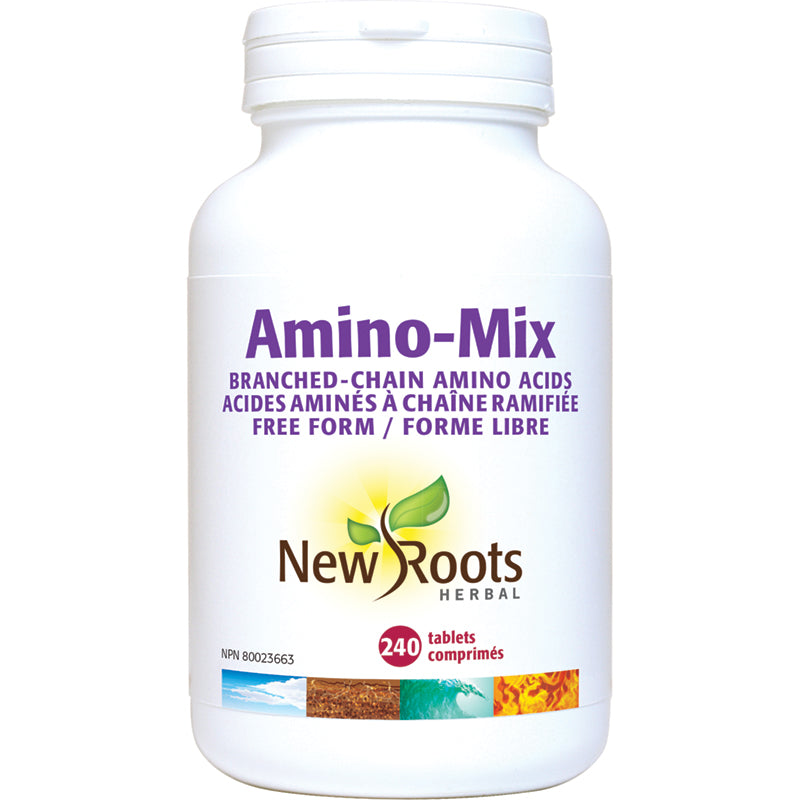Amino-Mix Branch Chain Amino Acids free form 240's New Roots
New Roots Herbal’s Amino‑Mix is made from 100% pure pharmaceutical-grade lactalbumine hydrolysate for maximal protein utilization. Each tablet provides the optimal mix of free-form di- and tripeptide amino acids. Amino‑Mix is a scientifically balanced source of both essential and nonessential amino acids. Amino‑Mix should be taken with a complete multivitamin, such as New Roots Herbal’s Multi‑Max or Multi‑Max Immune, as amino acids are dependent on vitamins and minerals to work.
Amino acids are organic molecules that form the basic constituents of proteins. Proteins are simply collections of large particles of accumulated links of peptides (or polypeptides). In the digestion process, proteins are broken down, in a process called hydrolyzation, from polypeptides to smaller oligopeptides, then to dipeptides or tripeptides, which are made up of two or three links of specific amino acids, called free-form amino acids, that are finally absorbed into the bloodstream. Therefore, we can see that amino acids are, quite simply, the most basic building blocks of proteins. Typically, discussions of amino acids revolve around about 20 or so amino acids that are involved in body function. Of these, eight (some say 10) are deemed to be essential due to the facts that: 1) the body cannot make them, therefore they must be taken in from an external source; and 2) the body cannot survive with a deficiency of any one of them. The essential amino acids are leucine, isoleucine, valine, methionine, lysine, threonine, phenylalanine, and tryptophan. The first three (leucine, isoleucine, and valine) are commonly referred to as “branched-chain amino acids” and are of particular importance due to their ability to provide the body with about 70% of its nitrogen needs. Studies have shown that a shortage of branched-chain amino acids, coupled with increased physical demands on the body, can lead to a cannibalization of muscle tissue to respond to the body’s need for nitrogen. Free-form amino acids are made up of high-grade individual amino acids. This form of amino acid needs no digestion and passes directly into the bloodstream to provide a hard-training athlete with amino acids for tissue repair and muscle hypertrophy. (Predigested amino acids have relatively low absorption and lack any amount of natural tryptophan.)
In the human body, amino acids not only form the building blocks of our voluntary, or skeletal, muscle tissue—such as the biceps, quadriceps, etc.—, but they also form the building blocks of our involuntary muscles—such as the heart. In addition to this muscle-building function, each individual amino acid has a specific function in the body; these functions include assisting in transporting long-chain triglycerides and dietary fat into the cells for energy; stimulating the pituitary to secrete growth hormone, which is involved in developing lean muscle tissue as well as mobilizing fatty acids from the adipose tissue; and—importantly—supplying the body with nitrogen. One of the more controversial topics regarding amino acids today is capsule absorption versus the value of using tablets. In past years, capsules definitely proved to have a quicker entry time into the system; however, this is no longer true: due to advances in tabulating technology, using magnesium stearate, the modern tablet today can actually dissolve faster than capsules.
